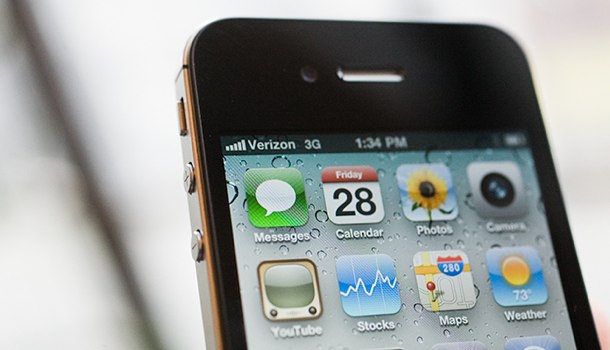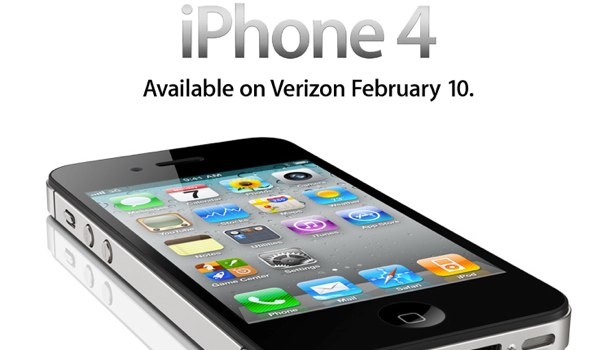The Verizon iPhone is but a few days away, but the reviews are already pouring in. Is it the best iPhone ever? Is Verizon’s iPhone the same as AT&T’s? Does Verizon’s network make a noteworthy impact? Does simultaneous voice and data really matter? Is this the end of AT&T? Well guess what: we’ve got the answers.
Reviewers have had their hands on the Verizon iPhone for long enough now, and they have now began to share their thoughts about the Verizon iPhone. The Verizon iPhone has been far too long in the waiting, but I think it is safe to say that this is a game changer. Mobile will never be the same again.

So how does the Verizon iPhone stack up? Let’s dive right in.
Cosmetics
If you were to just take a quick glance at the Verizon iPhone, you probably wouldn’t be able to tell the difference from AT&T’s iPhone. They both are incredibly similar, with only a few tiny discrepancies. To realize these differences, you might need to take a deeper look.
The differences between the AT&T and Verizon iPhone, from a cosmetic standpoint, are primarily with the buttons. The mute switch and the volume buttons on the side of the Verizon iPhone had to be adjusted slightly to accomodate the CDMA’s antenna design. What does this mean? Not much, really. It only impacts you if you have owned an iPhone 4 previously and are hoping to use a case from that phone — it might be necessary to buy a new one.
There are a few other changes that most people wouldn’t notice too, but, as Engadget points out, they are important. A fairly important one, at least from a technical standpoint, includes a shifting in the iPhone’s notches for the antenna. The reasoning offered by Apple acting CEO and COO Tim Cook was that these changes were made to accommodate the CDMA chipset, which is believable. What isn’t known is whether this is a dramatic improvement over the original iPhone 4. Remember that whole death grip thing?
Other than that, the phone looks as it did before, and that is not a bad thing. Not bad at all.
Internals
The only difference between the AT&T and the Verizon iPhone from an internal standpoint is the radio technology. The AT&T iPhone uses a GSM radio chip. The Verizon iPhone uses a CDMA (EV-DO Rev. A) chip. Everything else is the same. Easy.
Data
Leaving the hardware itself behind, we now start getting into the more important changes for Verizon iPhone. These changes involve the networks themselves. And the first thing we have to talk about is data, which might be surprising to some.
The Verizon iPhone is slower than the AT&T iPhone when handling data transfers. In testing performed by Engadget, Verizon managed around 1.10 Mbps download and 0.4 Mbps upload while AT&T transferred at speeds roughly 2.2 Mbps download and 1.0 Mbps upload (these are estimates and they will vary by location). Either way you look at it, though, the Verizon iPhone has slower data transfer speeds. But there is a catch.
Most reviews I’ve read have pointed out that, while the data transfers are slower, the data connectivity on the Verizon iPhone is substantially more stable — meaning that there were fewer interruptions in data transfer, thus a more consistent transfer experience. One reviewer noted that, for example, the Maps application performed better on Verizon because of fewer interruptions in data transfer.
It’s difficult to judge, but I would assume that Verizon could be better for data when handling data transfers that need a persistent connection (like Maps). But if you are planning on downloading MP3s, videos, movies, and other data-intensive media, your best bet will be on AT&T’s network, without question.
Voice
Verizon is better at voice, and there is no real debate about this. AT&T’s networks are not powerful as Verizon’s, don’t offer as much coverage as Verizon’s, and don’t stand a chance against Verizon’s.
Reviewers across the Web seem to universally agree that the Verizon iPhone is much better for voice calling as far as clarity, consistency, and dropped calls are concerned. So, if you want the best voice calling performance, then Verizon is where you want to be.
Simultaneous Voice & Data
Things get interesting, however, when you consider the possibility of using voice and data at the same time. For those of you who have used the AT&T iPhone, you know that you can talk to people and browse the Web, buy tickets, complain on Facebook, and do all the other data-centric activities on your device. On Verizon, however, you can’t do this.
AT&T is quick to point out that this is a serious problem with Verizon’s network. I (along with many, many others), however, would argue that it isn’t a big deal. I’ve been on Verizon’s network for years, and I have yet to find myself in a situation where I needed to use data and voice at the same time. Also, in recent years, my voice usage has decreased significantly, so there isn’t really that much of a concern.
Of course, if you are in some business where you have to listen to people on the phone and interact with data on your phone at the same time, this could prove to be a concern (or you could just buy an iPad). Either way, I don’t think this is the case of most consumers, and it is just something for AT&T to use as a marketing campaign.
But for that fraction of a percent that enjoy this feature, they will proudly complain as loud as possible that Verizon sucks because they don’t support it (and also the AT&T loyalists will do the same, which is their right to do so).
Battery, Software, and Pricing
Battery testing from reviews has confirmed that, even though CDMA typically sucks up more juice than GSM, the battery life for both Verizon and AT&T iPhones are excellent. Some are reporting up to 24 hours of regular usage (texting, Tweeting, e-mailing, browsing, calling) on a single charge, which is substantially better than my Droid X’s six-hour lifetime with similar usage.
On the software side of things there are few changes, with the exception of one major addition: the Personal Hotspot. This feature gives you the ability to broadcast a WiFi or Bluetooth signal to tether your other devices with. You simply turn it on, connect your devices, and continue on with your day-to-day activities. AT&T and other carriers around the world will have it once an update is pushed out, though. So it is only a temporary advantage.
But it’ll cost you $20 a month to enable it.
And, speaking of pricing, AT&T and Verizon are in the same ballpark, depending on the features you do or do not want. If you want unlimited data, minimal voice, and unlimited texting, you’ll end up paying $90 per month ($1,080 yearly) on Verizon to have your cake and eat it too, which is pretty close to AT&T’s offerings. AT&T has also officially done away with unlimited data plans (although users have been reported as getting them back if they complain), so if you like unlimited data, Verizon is the better value.
The Verdicts

Engadget thinks the best smart phone in the world just got a little bit better:
If you haven’t caught the theme of this review, let us spell it out — this is very much the iPhone 4 that people have come to know and love. It’s not the next generation Apple device, it’s not a wowee-zowee LTE experiment, and it isn’t a revolution in mobile computing. What it is, however, is a big chance to give a large portion of America’s smartphone users a crack at a phone they’ve likely been lusting after for some time. It’s also an opportunity to give relief to long-suffering AT&T customers in the form of a usable, reliable phone (not to mention a good way to kill many of the jokes the current phone’s calls have created). While it isn’t all rainbows and flowers (the data speed issues or the voice / data considerations could be a dealbreaker for some), it does kind of feel like Apple and Verizon did the impossible: they made the best smartphone in America just a little bit better.
All Things D believes that Verizon iPhone dominates in voice calling, but also warns that those traveling over seas or needing the fastest data possible might want to stick with AT&T:
Bottom line: In my tests, the new Verizon version of the iPhone did much better at voice calling than the AT&T version, and offers some attractive benefits, like unlimited data and a wireless hot-spot capability. But if you really care about data speed, or travel overseas, and AT&T service is tolerable in your area, you may want to stick with AT&T.
TechCrunch keeps it pithy:
There’s long been a slogan that goes along with many Apple products — “it just works”. It’s also the best way to sum up this review. The iPhone 4 on Verizon: it just works.
John Gruber, a trusted authority in Apple technology, sums it up best:
A lot of people have been waiting for four years for this phone. The funny thing is, by next month, the Verizon iPhone is going to seem like the most normal thing in the world.
